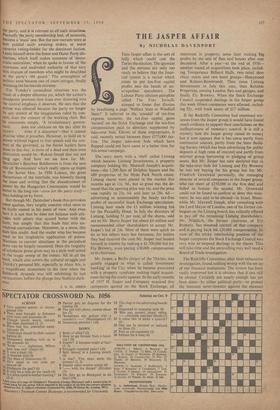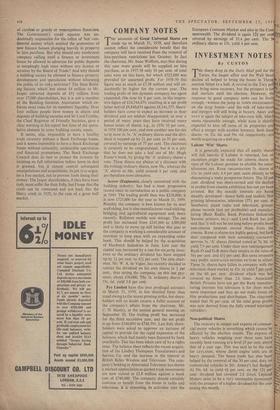THE JASPER AFFAIR
By NICHOLAS DAVENPORT The story starts with a 'shell' called Lintang which became Lintang Investments, a property company holding Mr. Maxwell Joseph's acquisi- tions—the 1,200 flats of Dolphin Square and the 680 properties of the Hyde Park North estate. Lintang shares were placed in the market five months ago at 1 Is. 9d., but so great was the de- mand that the opening price was 16s. and the price rose rapidly to 23s. 6d. and later to 28s. 6d.— advertising so unseasonably the heady tax-free profits of successful Stock Exchange speculation. Lintang later made the £3 million winning bid for the Piccadilly Hotel. In July the directors of Lintang, holding 51 per cent, of the shares, sold out to Mr. Harry Jasper for about £4 million and recommended other shareholders to accept Mr. Jasper's bid of 24s. Most of them were quick to do so but others were less fortunate, for before they had received the cash Mr. Jasper had landed himself in trouble by making a £1,700,000 bid for Ely Brewery, even paying £30,000 compensation to its chairman.
Mr. Jasper, a Berlin emigre of the Thirties, was quietly engaged in what is called 'investment banking' in the City when he became associated with a property syndicate making rapid acquisi- tions during the credit squeeze. In the early months of 1957 H. Jasper and Company acquired five companies quoted on the Stock Exchange, all
interested in property, some later making big profits by the sale of flats and houses after rent decontrol. After a year—at the end of 1958— another round of acquisitions took place, includ- ing Temperance Billiard Halls, two retail shoe chain stores and two hotel groups—Honywood and Rubens-Rembrandt. Then came Lintang Investments in July this year, then Reliable Properties, owning London flats and garages, and finally Ely Brewery. When the Stock Exchange Council suspended dealings in the Jasper group this week fifteen companies were affected, includ- ing Ely, with book assets of £17 million, If the Radcliffe Committee had examined wit- nesses from the Jasper group it would have found much evidence to support their conclusions on the ineffectiveness of monetary control. It is still a mystery how the Jasper group raised its money but it now appears that it has come partly from continental sources, partly from the State Build- ing Society (which has been advertising for public deposits at high rates of interest) and partly from internal group borrowing or pledging of group assets. But Mr. Jasper has now declared that in the take-over bids for Lintang and Ely Brewery he was not buying for his group but for Mr. Friedrich Grunwald personally, the managing director of several companies in the Jasper group, who ran short of £250,000 in the first deal and failed to honour the second. Mr. Grunwald could not be found to confirm or deny this state- ment; he was said to be abroad—in Israel. Mean- while Mr. Maxwell Joseph, after consulting with the Lord Mayor of London, one of his former col- leagues on the Lintang board, has valiantly offered to pay off the remaining Lintang shareholders. Mr. Nidditch, the former chairman of Ely Brewery, has resumed control of that company and is paying back his £30,000 compensation. In view of the tricky interlocking position of the. Jasper companies the Stock Exchange Council was very wise to suspend dealings in the shares. This will take time and the unravelling may well need a Board of Trade investigation.
The Radcliffe Committee, after their exhaustive investigation, found nothing wrong with the set-up of our financial institutions. The system has been vastly improved but it is obvious that it can still be abused. Certainly not nearly enough has yet been done—by either political party—to protect the innocent saver-investor against the excesses,
of careless or greedy or unscrupulous financiers. The Government's credit squeeze was un- doubtedly responsible for the influx of `hot' con- tinental money which assisted the promotion of new finance houses plunging heavily in property Or hire purchase. But why should any mushroom company calling itself a finance or investment house be allowed to advertise for public deposits at temptingly high rates without any licence or scrutiny by the Board of Trade? And why should a building society be allowed to finance property development and speculation without informing the public of its risky activities? The $tate Build- ing Society which lent about £4 million to Mr. Jasper attracted deposits of £9f million from over 17,000 shareholders, but it is not a member of the Building Societies Association which en- forces strict rules for its members' liquidity. Over four million people have money in shares and deposits of building societies and Sir Cecil Crabbe, the Chief Registrar of Friendly Societies, gave a clear warning in his report last June of the specu- lative element in some building society assets.
It seems, alas, impossible to have a healthy trade recovery without a Stock Exchange boom, and it seems impossible to have a Stock Exchange boom without unhealthy, undesirable speculation and financial promotions. The Stock Exchange Council does its best to protect the investor by insisting on full information before leave to deal is granted, but it cannot control subsequent manipulations and acquisitions; its job is to organ- ise a free market, not to prevent fools losing their money. The Jasper shareholders, if they have been rash, must suffer for their folly, but I hope that the crash can be contained and not lead, like the Hatry crash in 1929, to the ruin of a great bull market.



































 Previous page
Previous page